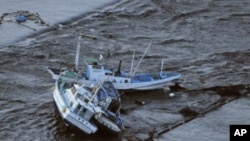The United Nations says it is ready to send expert teams to Japan to assist in search and rescue efforts in the wake of the massive tsunami that struck the northeastern part of Japan early Friday morning. The U.N. reports their experts are in direct contact with directors of disaster relief teams in Japan.
A U.N. spokeswoman, Elizabeth Byrs, says 35 international search and rescue teams are on alert. She says they are monitoring the situation and stand ready to assist.
“They are on standby, they are on alert and ready to go, should Japan request," said Byrs. "But so far, this is the usual process, there is no U.N. team deployed.”
Byrs says the United Nations draws its experts from a network of search and rescue teams in 80 countries. As soon as emergency help is requested, she says the U.N. immediately sends the teams that are closest to the disaster.
In the meantime, the International Red Cross Federation says evacuations have been successfully carried out in countries considered to be particularly vulnerable. They include the Philippines, Pacific Island States and Papua New Guinea.
The Red Cross previously had warned the waves triggered by the tsunami could be higher than some Pacific islands. But spokesman Paul Conneally tells VOA the waves are smaller than originally predicted. However, he cautions against complacency.
“As the situation looks right now, I think that these islands will have managed to dodge a major tsunami intact," said Conneally. "But then, the logistics differ as well from island to island. In some islands, yes, you can evacuate people by air. In other islands like Vanuatu, for instance, they are very dispersed, and the infrastructure is not necessarily there. So, it is a major challenge. It is going to be an ongoing concern in a region, which is very disaster prone.”
Conneally says there is a lot of uncertainty about the extent of the tsunami and how it might evolve. He notes tsunami alerts have been issued for the Asia-Pacific region, for the Americas and for Kenya.
He says the extent of the damage and loss of life from the 8.9-magnitude earthquake in Japan will not be known for some time. But given the scale of the disaster, he says it is bound to be widespread and very significant.
The Red Cross spokesman says the Japanese have an excellent capacity to respond to disasters. He notes many Red Cross volunteers are on the ground and are working closely with heavily affected local communities. In addition, 11 Japanese disaster response teams are carrying out emergency operations.
“Looking at the areas of health, shelter and nutrition and psychological support," he said. "And, they are increasing their deployments by the hour. And, really in Japan as the waters recede, probably in another 24 hours or so, we will begin to see exactly what is required in terms of disaster response.”
Conneally says a major clean-up operation will be required. He says there will be a lot of threats from aftershocks, and the Red Cross will have to keep a very close watch on this and reinforce support.
UN Search and Rescue Experts Ready To Go To Japan
- By Lisa Schlein











